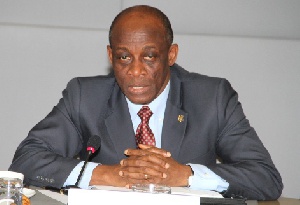Finance Minister Seth Terkper says he “regrets” his inability to remove from the 2015 budget temporary taxes -- such as special import and the national fiscal stabilisation levies introduced in 2013 following several shocks to the economy.
Mr. Terkper, speaking at the PwC’s 2015 Post Budget Highlights Breakfast Forum last week, said: “As a tax professional, one of my biggest regrets is inability to remove the temporary taxes that were introduced in 2013 as a result of the setbacks that year. As a country, Ghana should be able to have a set of fiscal tools that it can rely on whether they are revenue or expenditure.
“So in the event you come to the situation we were in 2012, you can fall on these tools and take them away as quickly as possible; and that should remain our goal. We know the advantages of maintaining a low tax regime,” he added.
With the introduction of the stabilisation levy, companies now pay up to 30 percent in corporate tax while all other imports excluding selected agriculture and fishing inputs, medical supplies, educational materials among others, will attract the special import levy.
By announcing a faster deficit reduction in next year’s budget, government had to boost its revenues significantly to meet its growing expenditure. Government is seeking to reverse a poor tax revenue performance, which this year is expected to accumulate GH¢19.4, two percent lower than the budget estimate.
But with government seeking a 31 percent increase in the previous year’s figure, the Ministry of Finance is hoping the extension of the stabilisation levy and special import tax in addition to the 17.5 percent petroleum tax among others will propel the revenue to GH¢25.4billion in 2015.
The tax revenue target announced in the 2015 budget represents 18.8 percent of GDP.
Extension of expiry date
The fiscal stabilisation and the special import levies were scheduled to expire in December 2014 and June 2015.
Mr. Terkper had in his 2014 budget presented in November 2013 asked Parliament to consider amending legislation on the two levies, and bring forward their expiry dates to June and December 2014 respectively.
Parliament did not approve Mr. Terkper’s request, meaning that the earlier expiry date remained valid. But presenting the 2015 budget statement and economic policy, the Finance Minister announced an extension of the five percent fiscal stabilisation levy and 1-2 percent special import levy to 2017 as government set its sight on an ambitious revenue target.
According to the Finance Minister, though corporate taxes could rise up to 30 percent, the country has one of the lowest tax regimes -- although he said government is committed to reducing further the tax regime to attract more investors.
The PwC Forum held on the theme “Transformational Agenda: Securing the Bright Medium Term Prospects of the Economy”, was attended by business leaders as well as government officials.
According to the Country Senior Partner at PricewaterhouseCoopers, Felix Addo, government must devise ways to widen the tax net rather than increasing the burden on the already taxed population.
Business News of Monday, 8 December 2014
Source: B&FT
Terkper regrets rising tax burden
Entertainment












